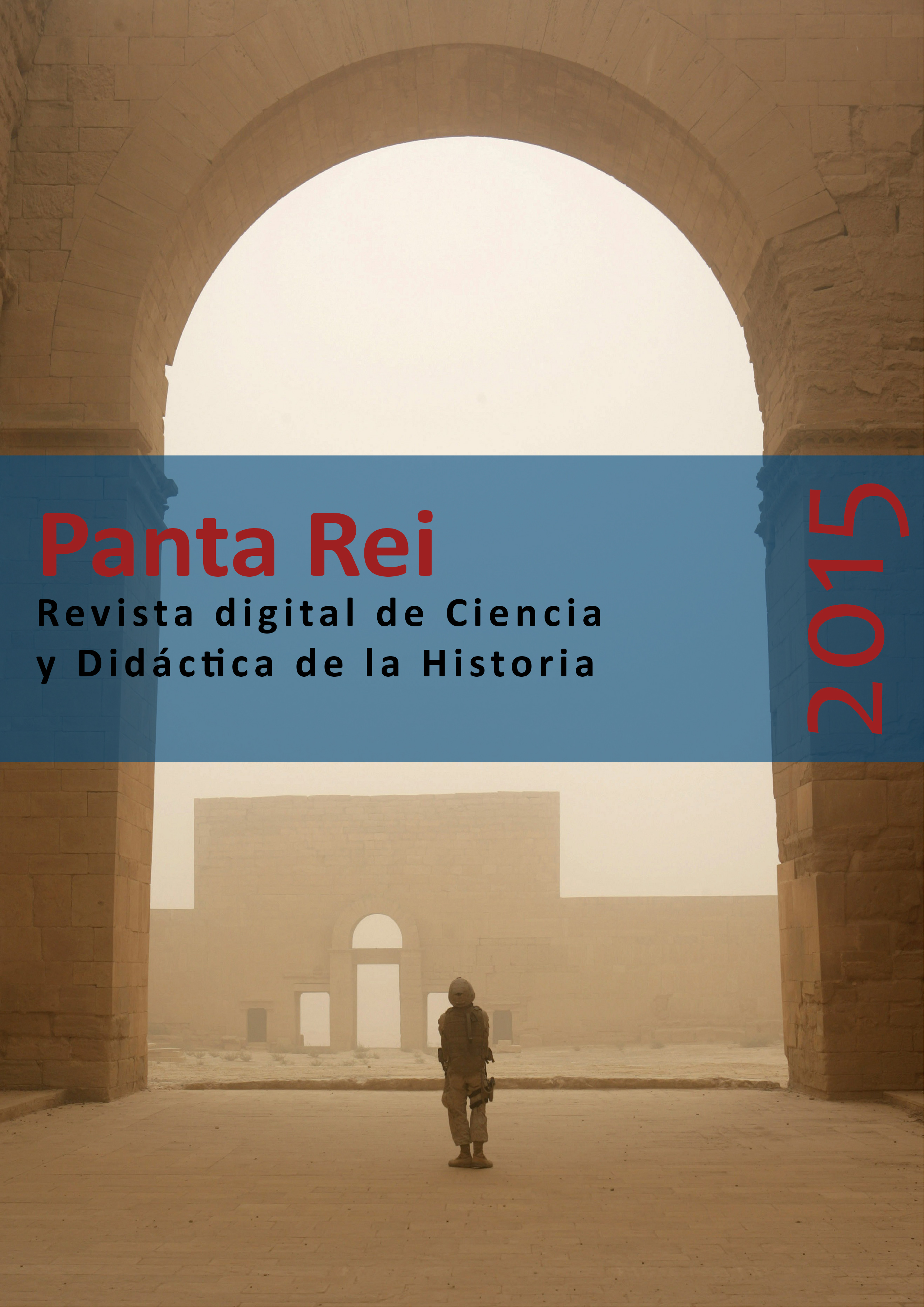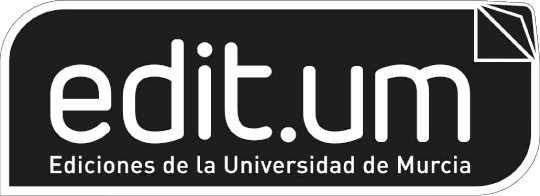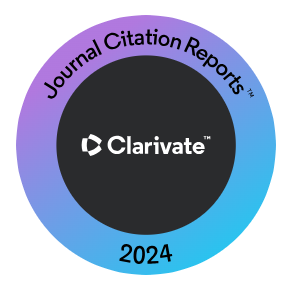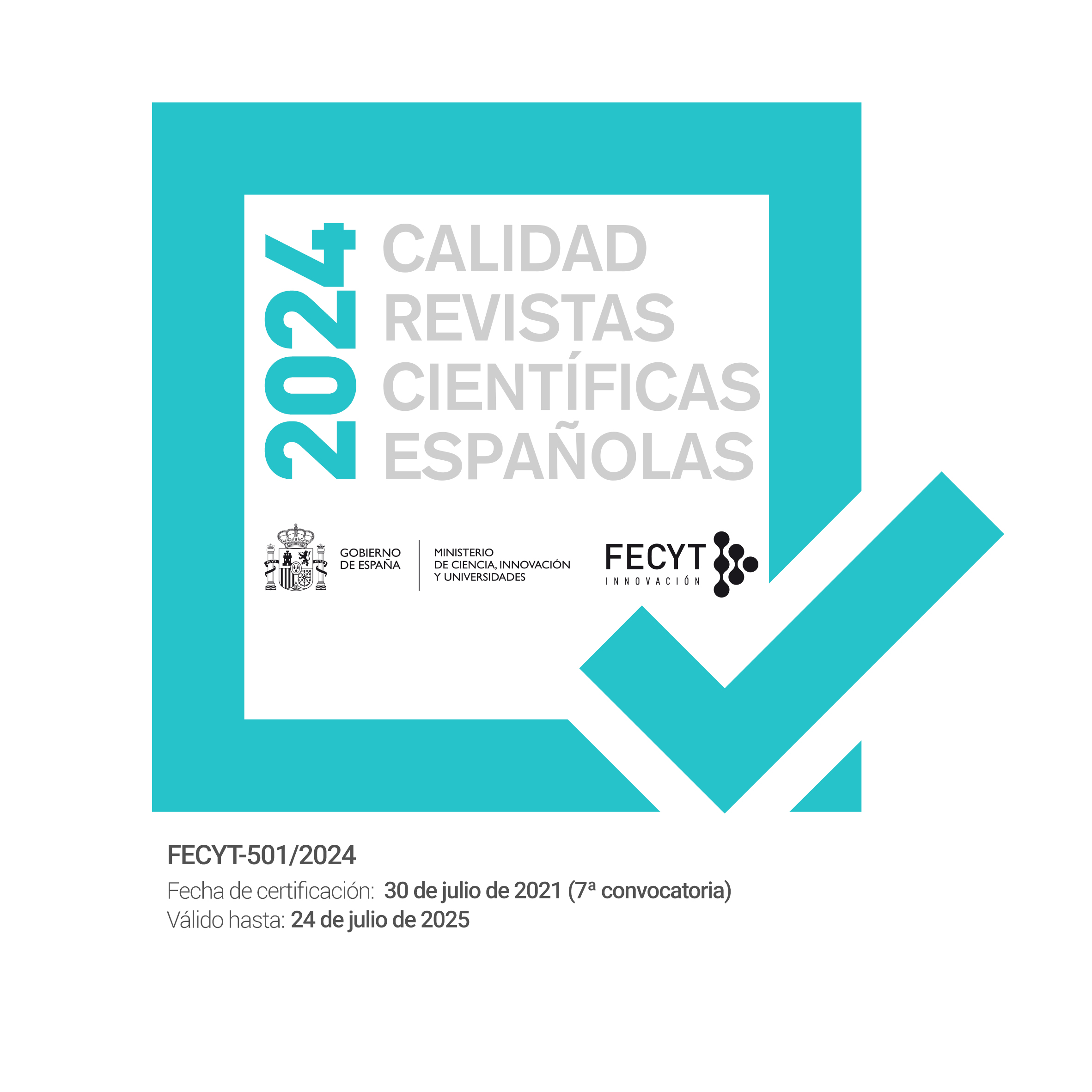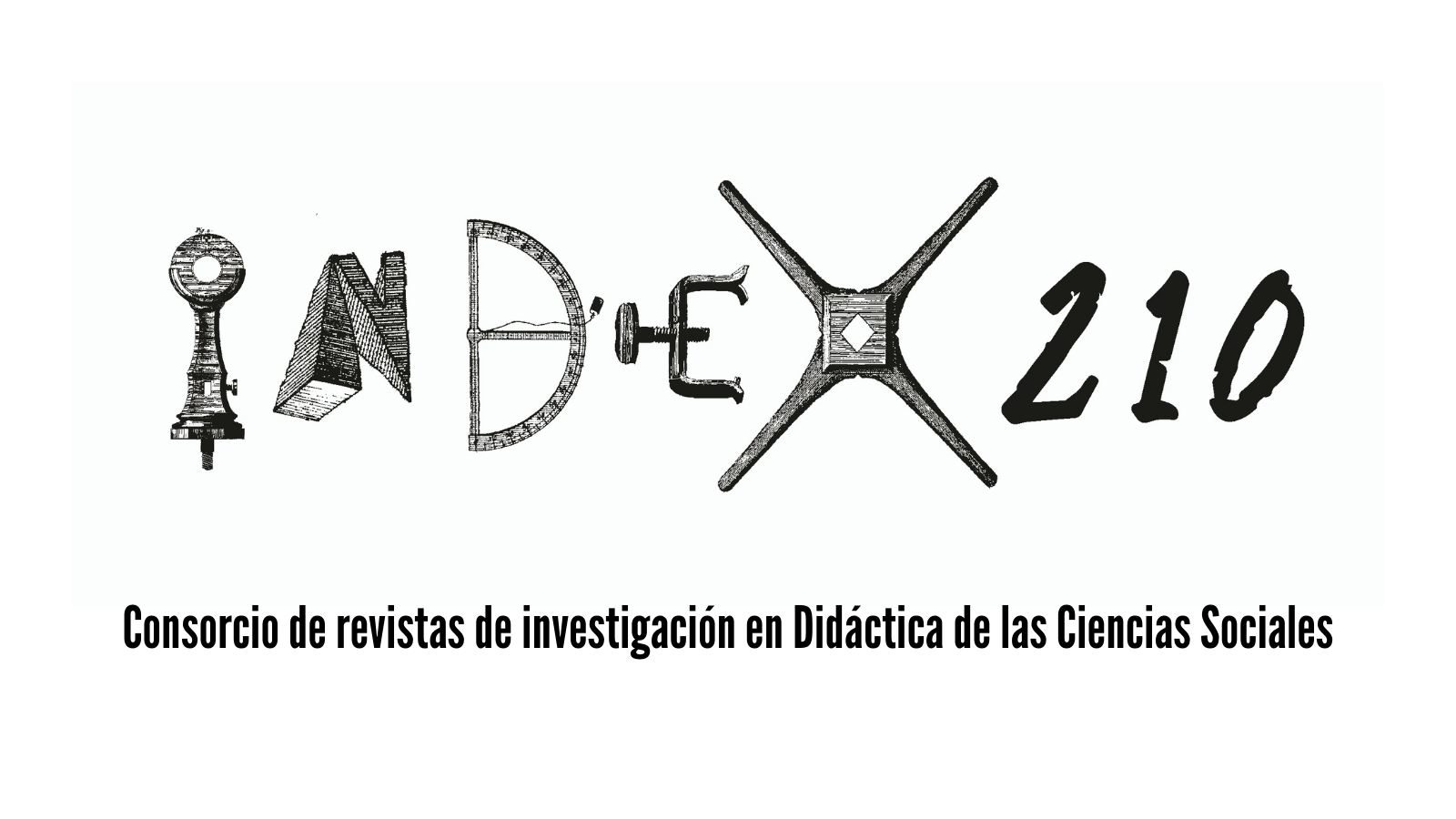Re-thinking national narratives: An analysis of their origins, transmission and influence on historical learning
Abstract
The narrative format plays a central role in the field of history, both in the production of historical knowledge and its transmission and also when it comes to learning. One of the most common and dominant narratives are the so-called national narratives. These narratives, frequently based on myths and legends, aim to celebrate the nation and hinder a critical understanding of the past. This article seeks a better understanding of the role that these national narratives play in the production and consumption of historical knowledge through an analysis in different contexts: academic, school and at an informal ambit. Finally, some of the most recent empirical studies on the influence of these national narratives on students learning are discussed.
Downloads
-
Abstract780
-
PDF (Español (España))291
References
Alridge, D. P. (2006). The limits of master narratives in history textbooks: An analysis of representations of Martin Luther King, Jr. Teachers College Record, 108, 662-686.
Álvarez Junco, J. (2001). Mater dolorosa. La idea de España en el siglo XIX. Madrid: Santillana.
Anderson, B. (1983). Imagined communities: reflections on the origin and spread of nationalism. London: Verso.
Asensio, M. y Pol, E. (2012). From Identity Museums to Mentality Museums: Theoretical basis for history museums. En Carretero, M., Asensio, M. y Rodríguez-Moneo, M. (eds.), History Education and the Construction of National Identities (pp. 257-268). Charlotte CT: Information Age Publishing.
Aunión, J. A. (2012, 10 de Octubre). Wert quiere “españolizar” Cataluña. El País. Recuperado de http://sociedad.elpais.com
Balibar, E. (1991). The nation form: history and Ideology. En Wallerstein, I. y Balibar, E. (eds.), Race, Nation, Class: ambiguous identities (pp. 86-106). London: Verso.
Ballantyne, T. (2005). Putting the nation in its place?: World history and C. A. Bayly’s The birth of the modern world. In Curthoys, A. y Lake, M. (eds.), Connected Worlds: History in transnational perspective (pp. 23-44). Canberra: ANU E press.
Bartlett, F.C. (1932). Remembering: A study in experimental and social psychology. Cambridge: Cambridge University Press.
Barton, K. C. (2009). The denial of desire: How to make history education meaningless. En Symcox, L. y Wilschut, A. (eds.), International review of History education: National History Standars. The problem of the canon and the future of teaching History (pp. 265-282). Charlotte, NC.: Information Age Publishing.
Barton, K. C. y Levstik, L. (ed.). (2004). Teaching History for the Common Good. Mahwah, NJ: Lawrence Erlbaum Associates, Inc.
Barton, K. C. y McCully, A. W. (2005). History, Identity, and the School Curriculum in Northern Ireland: An Empirical Study of Secondary Students’ Ideas and Perspectives. Journal of Curriculum Studies, 37(1), 85-116.
Berger, S., Eriksonas, L. y Mycock, A. (eds.) (2011). Narrating the nation: Representations in History, Media and the Arts. New York: Berghahn Books.
Billig, M. (1995). Banal Nationalism. London: Sage.
Bruner, J. (1990). Acts of Meaning. Cambridge, MA: Harvard University Press.
Carretero, M. (2011) Constructing patriotism. Teaching of history and memories in global worlds. Charlotte, CT: Information Age Publishing.
Carretero, M. y Bermúdez, A. (2012). Constructing Histories. En Valsiner, J. (ed.), Oxford Handbook of Culture and Psychology (pp. 625-646). Oxford: Oxford University Press.
Carretero, M. y Kriger, M. (2006). La usina de la patria y la mente de los alumnos. Un estudio sobre las representaciones de las efemérides escolares argentinas. En Carretero, M., Rosa, A. y González, M. F. (eds.), Enseñanza de la Historia y Memoria colectiva (pp. 169-196). Buenos Aires: Paidós.
Carretero, M. y Kriger, M. (2008). Narrativas históricas y construcción de la identidad nacional: representaciones de alumnos argentinos sobre el “Descubrimiento” de América. Cultura y Educación, 20(2), 229-242.
Carretero, M. y Kriger, M. (2011). Historical representations and conflicts about indigenous people as national identities. Culture and Psychology, 17(2), 177-195.
Carretero, M., Jacott, L. y López-Manjón, A. (2002). Mexican and Spanish history textbooks. Do students learn the same story? Learning and Instruction, 12, 651-665.
Carretero, M. y López, C. (2010). The Narrative mediation on historical remembering. En Salvatore, S., Valsiner, J., Simon, J. T. y Gennaro, A. (eds.), Yearbook of Idiographic Science (Vol. 3) (pp. 285-294). Roma: Firera y Liuzzo.
Carretero, M., López, C., González, M. F. y Rodríguez-Moneo, M. (2012). Students historical narratives and concepts about the nation. En Carretero, M., Asensio, M. y Rodríguez-Moneo, M. (eds.), History Education and the Construction of National Identities (pp. 153-170). Charlotte CT: Information Age Publishing.
Carretero, M. y Montanero, M. (2008). Enseñanza y aprendizaje de la Historia: aspectos cognitivos y culturales. Cultura y Educación, 20(2), 133-143.
Carretero, M. y Van Alphen, F. (2014). Do Master Narratives Change Among High School Students? A Characterization of How National History Is Represented. Cognition and Instuction, 32(3), 290-312.
Connor, W. (2004). The timelessness of nations. Nations and Nationalism, 10, 35-47.
Cruz Prados, A. (2005). El nacionalismo, una ideología [Nationalism, an ideology]. Madrid: Tecnos.
Duara, P. (ed.). (1995). Rescuing History from the Nation: Questioning Narratives of Modern China. Chicago: University of Chicago Press.
Egan, K. (1997). The Educated Mind: How Cognitive Tools Shape Our Understanding. Chicago: The University of Chicago Press.
Finn, P. (2007, July 20). New manuals push a Putin’s-eye view in Russian schools. The Washington Post. Recuperado de http://www.washingtonpost.com
Foster, S. (2006). Whose History? Portrayal of immigrant groups in U.S. History textbooks, 1800-Present. En Foster, S. J. y Crawford, K. A. (eds.), What shall we tell the children? International perspectives on school history textbooks (pp 155-178). Greenwich, CT: Information Age Publishing.
Foster, S. (2012). Re-thinking historical textbooks in a globalised world. En Carretero, M., Asensio, M. y Rodríguez-Moneo, M. (eds.), History Education and the Construction of National Identities (pp. 49-62). Charlotte CT: Information Age Publishing.
Gellner, E. (1983). Nations and nationalism. New York: Cornell University Press.
González de Oleaga, M. (2012). Historical narratives in the colonial, national and ethnic museums of Argentina, Paraguay and Spain. En Carretero, M., Asensio, M. y Rodríguez-Moneo, M. (eds.) History education and the construction of national identities (pp. 239-255). Charlotte, NC: Information Age Publishing.
Grever, M. (2006). Nationale identiteit en historisch besef. De risico’s van een canon in de postmoderne samenleving [Identidad Nacional y Conciencia Histórica. Riesgos de un canon en una sociedad posmoderna]. Tijdschift voor Geschiedenis, 119, 160-177.
Grever, M. y Stuurman, S. (eds.) (2007). Beyond the Canon: History for the 21st century. London: Palgrave Macmillan.
Hobsbawm, E. (1997). Nations and Nationalism since 1780: programme, myth, reality. Cambridge: Cambridge University Press.
Hobsbawm, E. y Ranger, T. (eds.). (1983). The Invention of Tradition. Cambridge: Cambridge University.
Hsiao, Y. (2005). Taiwanese Students’ Understanding of Differences in History Textbook Accounts. En Ashby, R., Gordon, P. y Lee, P. (eds.), Understanding History. International review of History Education. Vol. IV (pp. 54-67). New York: Routledge.
Ichijo, A. y Uzelac, G. (eds.) (2005). When is the Nation? New York: Routledge.
Janmaat, J. G. (2005). Ethnic and Civic Conceptions of the Nation in Ukraine’s History Textbooks. European Education, 37(3), 20-37.
López, C. y Carretero, M. (2012). Identity construction and the goals of history education. En Carretero, M., Asensio, M. y Rodríguez-Moneo, M. (eds.), History education and the construction of national identities (pp. 139–150). Charlotte, NC: Information Age Publishing.
López, C., Carretero, M. y Rodríguez-Moneo, M. (2014a). Conquest or Reconquest? Students’ Conceptions of Nation Embedded in a Historical Narrative. Journal of the Learning Sciences, 24(2), 252-285.
López, C., Carretero, M. y Rodríguez-Moneo, M. (2014b). Telling a national narrative that is not your own. Does it enable critical historical consumption? Culture y Psychology, 20(4), 547–571.
Lorenz, C. (2011). Drawing the line: `Scientific´ history between Myth-making and Myth-breaking. En Berger, S., Eriksonas, L. y Mycock, A. (eds.), Narrating the nation: Representations in History, Media and the Arts (pp. 35-55). New York: Berghahn Books.
Mak, G. (2005). Gedoemd tot kwetsbaarheid [Doomed to vulnerability]. Amsterdam: Atlas.
Mandler, J. M. (1984). Stories, scripts and scenes: Aspects of schema theory. Hillsdale, NJ: Lawrence Erlbaum Associates.
Nakou, I. y Barca, I. (eds.) (2010). Contemporary public debates over history education. International Review of History Education Series. Charlotte, NC: Information Age Publishing.
Paxton, R. J. (1999). A Deafening Silence: History Textbooks and the Students Who Read Them. Review of Educational Research, 69(3), 315-339.
Pérez Garzón, J. S. (2001). Nación española y revolución liberal: la perspectiva historiográfica de los coetáneos [Spanish nation and liberal revolution: historiographical perspective of contemporary people]. En Forcadell, C.y Peiró, I. (eds.). Lecturas de la Historia: Nueve reflexiones sobre la Historia de la Historiografía (pp. 23-54). Zaragoza: Institución Fernando el Católico.
Renan, E. (1882). What is a Nation? En Bhabha, H. K. (1990) (ed.), Nation and Narration (pp. 8-22). Routledge: London.
Ríos Saloma, M. F. (2005). From the Restoration to the Reconquest: The construction of a national myth (An historiographical review. 16th -19th centuries). España medieval, 28, 379-414.
Ross, M. (1989). Relation of Implicit Theories to the Construction of Personal Histories. Psychological review, 96(2), 341-357.
Rüsen, J. (2004). Historical Consciousness: narrative structure, moral function, and ontogenetic development. En Seixas, P. (ed.), Theorizing historical consciousness (pp. 63-85). Toronto: University of Toronto Press.
Smith, A. D. (1991) National Identity. London: Penguin.
Symcox, L. y Wilschut, A. (2009). Introduction. En Symcox, L. y Wilschut, A. (eds.), National History Standars. The problem of the canon and the future of teaching History. International review of History education (Vol. 5. pp. 1-11). Charlotte, NC.: Information Age Publishing.
Valsiner, J. (2012). Monuments in our minds: Historical symbols as cultural tools. En Carretero, M., Asensio, M. y Rodríguez-Moneo, M. (eds.), History education and the construction of national identities (pp. 327–346). Charlotte, CT: Information Age Publishing.
Van der Leeuw-Roord, J. (ed.) (2004). History changes. Facts and figures about history education in Europe since 1989. The Hague: EUROCLIO.
Van der Leeuw-Roord, J. (2007). Two Steps Forward, One Step Back: Shoring Our Stories and Looking for the Common Threads. En Smart, D. (ed.), Making a Difference: Fifteen years of EUROCLIO (pp. 66-73). The Hague: EUROCLIO.
Van der Leeuw-Roord, J. (2009). Yearning for yesterday. Efforts of history professionals in Europe at designing meaningful and effective school History curricula. En Symcox, L. y Wilschut, A. (eds.), National History Standards. The problem of the canon and the future of teaching History. International review of History education (Vol. 5. pp. 73-94). Charlotte, NC.: Information Age Publishing.
VanSledright, B. (2008). Narratives of Nation-State, Historical Knowledge, and School History Education. Review of Research in Education, 32(1), 109-146.
Vasagar, J. (2012, November 24). Michael Gove accuses exam system of neglecting British history. The Guardian. Recuperado de http://www.guardian.co.uk
Von Borries, B. (2009). Competence of historical thinking, mastering of a historical framework, or knowledge of the historical canon? En Symcox, L. y Wilschut, A. (eds.), National history standards: the problem of the canon and the future of teaching history (pp.283-306). USA: Information Age Publishing.
Wallerstein, I. (1991). The construction of peoplehood: racism, nationalism, ethnicity. En Wallerstein, I. y Balibar, E. (eds.), Race, Nation, Class: ambiguous identities (pp. 71-85). London: Verso.
Wertsch, J. V. (2004). Specific narratives and Schematic narrative templates. En Seixas, P. (ed.), Theorizing historical consciousness (pp. 49-62). Toronto: University of Toronto Press.
Wineburg, S. (2001). Historical Thinking and Other Unnatural Acts. Philadelphia: Temple University Press.
Wineburg, S., Mosborg, S. y Porat, D. (2001). What Can Forrest Gump Tell Us about Students’ Historical Understanding? (motion picture). Social Education, 65(1), 55.
Wineburg, S., Mosborg, S., Porat, D., y Duncan, A. (2007). Common Belief and the Cultural Curriculum: An Intergenerational Study of Historical Consciousness. American Educational Research Journal, 44, 40-76.
Copyright (c) 2015 César López Rodríguez

This work is licensed under a Creative Commons Attribution-ShareAlike 4.0 International License.
All the contents published in this journal are subject to an Attribution-ShareAlike 4.0 International (CC BY-SA 4.0) Creative Commons License. You are free to: Share — copy and redistribute the material in any medium or format, Adapt — remix, transform, and build upon the material, for any purpose, even commercially. Under the following terms:
Attribution — You must give appropriate credit, provide a link to the license, and indicate if changes were made. You may do so in any reasonable manner, but not in any way that suggests the licensor endorses you or your use.
ShareAlike — If you remix, transform, or build upon the material, you must distribute your contributions under the same license as the original.
Full text of the license is available in: Creative Commons License 

